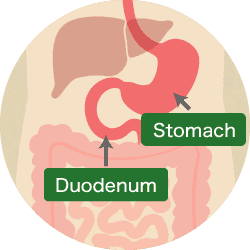
Symptoms of an upset stomach include heaviness of the stomach, feeling sick, and bitterness in the stomach. You will not have much appetite if you have an upset stomach.
Although an upset stomach can resolve by itself, you should take care of it as soon as possible. If you have chronic stomach upset, it is recommended that you seek medical care.

What causes an upset stomach?

Upset stomach is a condition in which food remains in the stomach for longer than usual.
There are two main causes of this condition: gastric digestion is taking longer; or the digested food takes longer to exit the stomach
Digestion in the stomach takes longer
Food is chewed in the mouth and then enters the stomach through the esophagus. Next, it is mixed with gastric juice to form a porridge-like substance that is pumped into the duodenum.
While it is obvious that an excessive amount of food will prolong this process, certain foods, even in small amounts, may take a long time to digest.
Foods that take a long time to digest
- Meats
- Fatty foods
- Fibers
Foods that are easily digested
- Rice porridge
- Udon noodles
- Soft, boiled vegetables

As the function of the stomach slows during sleep, digestion will take longer if you sleep with food in the stomach.
Difficulties in food exiting the stomach
Food mixed with gastric juice in the stomach enters the duodenum by the movement of the stomach (peristalsis).
Problems in peristalsis lead to more time required for the food to enter the duodenum, leading to an upset stomach.
The autonomic nervous system is involved in peristalsis, and its function can be reduced by stress. Stress can easily upset the stomach because of the disturbed balance of the autonomic nerves.
How can one deal with an upset stomach?

It will be easy to deal with an upset stomach if you are aware of the following two possible causes: gastric digestion is taking longer; or the digested food takes longer to exit the stomach.
Do not binge eat or eat in a rush
If you eat a lot at a time, more time is required to break down the consumed food; thus, keep in mind to eat “until your stomach is only 80% full.” Chewing the food well into smaller pieces before swallowing will help minimize the occurrence of an upset stomach.

Do not eat immediately before going to bed
Eating just before bedtime increases digestion time and can cause an upset stomach. Try to maintain a 2–3-hour gap between a meal and bedtime. Do not eat fatty foods and meat because they take a long time to be broken down.

Live a stress-free life
Stress decreases gastrointestinal function. Engage in mild exercise to relieve stress, as it can promote blood circulation and help stimulate the functioning of the stomach. Relieving stress by smoking is not advisable because smoking adversely affects the stomach and intestines.



